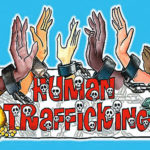By: Bayo Akeem
In her impactful book, The Role of Technology in Enhancing Supply Chain Visibility in Africa, Nigerian supply chain strategist andco-founder; Olajumoke Aroyewun delivers a timely and nationally significant contribution to Africa’s economic advancement. As Nigeria intensifies efforts to modernize its logistics systems, expand regional trade under the African Continental Free Trade Area, and strengthen digital infrastructure, this book offers a clear, strategic roadmap for achieving supply chain resilience through technology.
Drawing from over a decade of practical experience in the field, she presents a compelling case for integrating blockchain, artificial intelligence (AI), the Internet of Things (IoT), and automation into the core of African logistics systems. Her approach balances innovation with implementation, offering concrete tools and real-world examples tailored to the operational realities of Nigeria’s fragmented and often informal supply ecosystems.
The book; The Role of Technology in Enhancing Supply Chain Visibility in Africa aligns directly with Nigeria’s National Development Plan, which prioritizes infrastructure upgrades, manufacturing sector growth, and the digital economy. By framing visibility not just as a technical advantage but as a national asset, her work supports key government goals such as improving transparency in procurement, reducing wastage, and strengthening public-private partnerships in trade logistics.
The book’s relevance extends beyond business innovation. It is increasingly referenced in development policy circles and regional economic integration efforts. As African nations race to harmonize trade and transport systems under AfCFTA, her framework for enhancing transparency, reducing cross-border delays, and digitizing vendor networks provides an essential playbook for national competitiveness. Her emphasis on inclusive systems also ensures that small manufacturers, local distributors, and rural entrepreneurs are not left behind.
In Nigeria, where weak logistics coordination undermines everything from food distribution to healthcare delivery, the practical tools outlined in this book are more than timely; they are urgent. The book’s influence is already being felt in academic institutions, policy review panels, and enterprise training programs focused on digital supply chain transformation.
By bridging technological potential with actionable guidance, she offers more than a vision, she delivers a scalable model that speaks to Nigeria’s most pressing economic challenges. As the country moves toward a future defined by smart infrastructure, integrated trade systems, and digital innovation, her contribution is positioned not just as useful, but as nationally essential.
WATCH TOP VIDEOS FROM NIGERIAN TRIBUNE TV
- Let’s Talk About SELF-AWARENESS
- Is Your Confidence Mistaken for Pride? Let’s talk about it
- Is Etiquette About Perfection…Or Just Not Being Rude?
- Top Psychologist Reveal 3 Signs You’re Struggling With Imposter Syndrome
- Do You Pick Up Work-Related Calls at Midnight or Never? Let’s Talk About Boundaries







